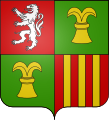Bonnac, Ariège
You can help expand this article with text translated from the corresponding article in French. (December 2008) Click [show] for important translation instructions.
|
Bonnac | |
|---|---|
| Coordinates: 43°10′01″N 1°35′36″E / 43.1669°N 1.5933°E | |
| Country | France |
| Region | Occitania |
| Department | Ariège |
| Arrondissement | Pamiers |
| Canton | Portes d'Ariège |
| Government | |
| • Mayor (2020–2026) | Daniel Courneil[1] |
Area 1 | 9.63 km2 (3.72 sq mi) |
| Population (2021)[2] | 783 |
| • Density | 81/km2 (210/sq mi) |
| Time zone | UTC+01:00 (CET) |
| • Summer (DST) | UTC+02:00 (CEST) |
| INSEE/Postal code | 09060 /09100 |
| Elevation | 237–413 m (778–1,355 ft) (avg. 268 m or 879 ft) |
| 1 French Land Register data, which excludes lakes, ponds, glaciers > 1 km2 (0.386 sq mi or 247 acres) and river estuaries. | |
Bonnac (French pronunciation: [bɔnak]; Occitan: Bonac) is a commune in the Ariège department of southwestern France. It lies between the altitudes of 237 and 413 m. The village currently lies at the bottom of a hill but was previously located on the hill as evidence by remains of foundations. A castle, now ruined, lay on top of the hill and was itself built on top of Roman foundations. The most notable building is the Eglise Saint-Pierre which dates to the 12th century and houses a baptismal font dating back to the early Romanesque era.
Population
[edit]Inhabitants of Bonnac are called Bonnacois.
| Year | Pop. | ±% |
|---|---|---|
| 1962 | 571 | — |
| 1968 | 587 | +2.8% |
| 1975 | 581 | −1.0% |
| 1982 | 615 | +5.9% |
| 1990 | 646 | +5.0% |
| 1999 | 680 | +5.3% |
| 2008 | 717 | +5.4% |
| 2012 | 755 | +5.3% |
See also
[edit]Bonnac is home to a number of companies, including Laines Paysannes, whose aim is to promote wool as a natural and sustainable resource. Laines Paysannes is committed to supporting a traceable, local wool industry. (https://laines-paysannes.fr)
References
[edit]- ^ "Répertoire national des élus: les maires". data.gouv.fr, Plateforme ouverte des données publiques françaises (in French). 9 August 2021.
- ^ "Populations légales 2021" (in French). The National Institute of Statistics and Economic Studies. 28 December 2023.
External links
[edit]



